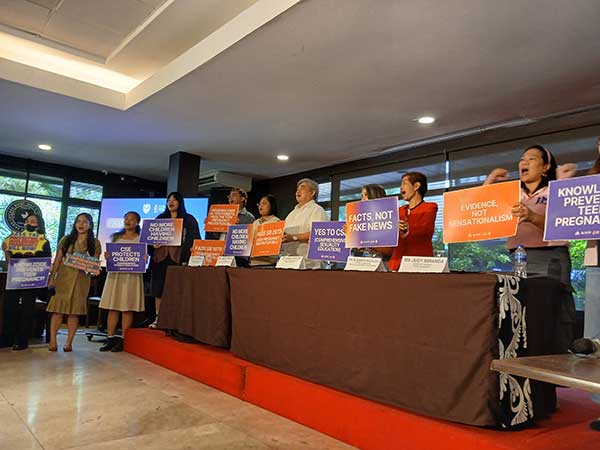Advocacy group Forum for Family Planning and Development (The Forum) has raised alarm over the reported 11,479 incidents of rape involving girls under 16 years old in 2023, citing the Philippine Statistics Authority (PSA).
Despite these staggering figures, not a single case under Republic Act 11648, which raises the age of statutory rape from 12 to 16, was filed that year.
Citing data from the government’s 2023 Responsible Parenthood and Reproductive Health (RPRH) Law annual report, The Forum underscored that every adolescent pregnancy involving girls 16 and below stems from at least one rape incident.
Dr. Juan Antonio Perez III, vice president of The Forum, lamented the lack of action despite the evidence recorded in civil registrars across local governments.
“This information is lodged with the civil registrars of all local governments in the country, yet it was not flagged as a potential criminal incident that should have been investigated by police and prosecuted if indeed covered by the law,” he said.
Perez called for urgent action, noting the increasing frequency of statutory rape cases among children aged 9 to 16 years old.
ALARMING STATISTICS
The PSA data revealed that 99.3% of pregnancies among 9- to 14-year-old girls involved fathers aged 15 or older, or with unreported ages.
Dr. Perez pointed out that adolescent pregnancies in this age group rose by nearly 8% compared to 2022, a trend he says government agencies have been warning about for years.
“The 2023 data indicate an almost 8% rise in under-16 adolescent pregnancy compared to 2022,” Perez said. “This is not unexpected since government agencies have been warning of this for years.”
Perez expressed frustration at the slow implementation of RA 11648, which was signed into law by former President Rodrigo Duterte on March 4, 2022.
The law provides stronger protection against sexual abuse by raising the statutory rape age to 16, and mandates public and private schools to create systems to detect and prevent such incidents. It also requires the Department of Education (DepEd) to integrate children’s rights and protection into the curriculum.
“The law calls on public and private schools to set up systems to detect and prevent these incidents,” Perez said. “Yet where is the action?”
ENFORCEMENT ISSUES PERSIST
The uninvestigated incidents of statutory rape are five times higher than the 2,634 cases of rape filed under Republic Act 8353 (the Anti-Rape Law of 1997) in the same year.
The Supreme Court issued guidelines on RA 11648 on March 25, 2024, clarifying its implementation. According to the court, proof of force, intimidation, or consent is unnecessary in statutory rape cases, as the victim’s inability to give consent is presumed.
Perez stressed the severity of statutory rape cases, noting that a proven case carries a penalty of reclusion perpetua or life imprisonment.
“Statutory rape, when proven, means a life sentence,” Perez said. “Despite the clear evidence in administrative documents such as birth certificates or health records, agencies except for the Supreme Court have failed to issue any guidelines on how they will enforce the law. This is a clear instance of government neglect which continues to harm our children.”
CALLS FOR GOVERNMENT ACTION
Perez called on the senators who supported RA 11648 to press DepEd and the Department of Justice (DOJ) to take immediate action.
He urged DepEd to clarify how it enforces the law in schools and recommended DOJ investigate and prosecute offenders identified through birth certificates and other administrative records.
Perez also advocated for Comprehensive Sexuality Education to begin at age eight to better inform children and prevent abuse.
“The increase in potentially criminal acts involving at least 11,000 children from 2023 requires a comprehensive approach,” Perez said. “This should include Comprehensive Sexuality Education beginning at eight years old and the provision of health, social, and mental health services when necessary.”
Perez also emphasized the importance of enforcing RA 11648 to create a deterrent against statutory rape.
“The chilling effect of enforcement of the statutory rape law is an essential first step,” he said.
A SYSTEMIC PROBLEM
The lack of enforcement is part of a broader issue in how the government handles sexual exploitation and abuse cases.
In 2024, the Philippine Commission on Women celebrated the second anniversary of RA 11648, but no clear guidelines on enforcement were issued beyond the Supreme Court’s ruling.
Meanwhile, the Department of Education disseminated the law to schools in March 2022 without comment on its implementation, leaving gaps in the system.
The Forum has called on the government to act swiftly, saying neglecting to enforce the statutory rape law continues to endanger thousands of children every year.


























